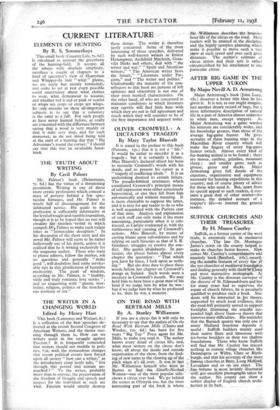OLIVER CROMWELL : A DICTATOR'S TRAGEDY By Mary Taylor Blauvelt
It is stated in the preface to this book (Putnam, r5s.) that it is not a " life." It would be unfair to describe it as a tragedy ; but it is certainly a failure. Miss Blauvelt's declared object has been to reconcile Cromwell's words with his deeds, and to present his career as a " tragedy of conflicting ideals." It is an undertaking doomed to certain failure. The pseudo-biblical utterances which constituted Cromwell's principal means of self-expression were either consciously hypocritical, or else they fell from him automatically and without meaning. It is more charitable to suppose the latter, and it is easy for any reader to do so who is well acquainted with the Puritan cant of that time. Analysis and explanation of such stuff can only make it the more nauseating,- particularly when it is con- trasted, as Carlyle contrasted it, with the ruthlessness and cunning of Cromwell's actions. Miss Blauvelt, by means of casting blame upon subordinates and by relying on such histories as that of S. R. Gardiner, struggles tm resolve the con- Rift. She quote's abundantly. In par- ticular, she places before almost every chapter the quotation : " That which lou have by force, I look upon as noth- ing." But she does dare to place these words before her chapter on Cromwell's doings in Ireland. Such words were a mockery in Cromwell's mouth. We may hold him to have been a great man of his kind if we judge him by what he was : but if we judge him by what he professed to be, then he was a monster.


















































 Previous page
Previous page